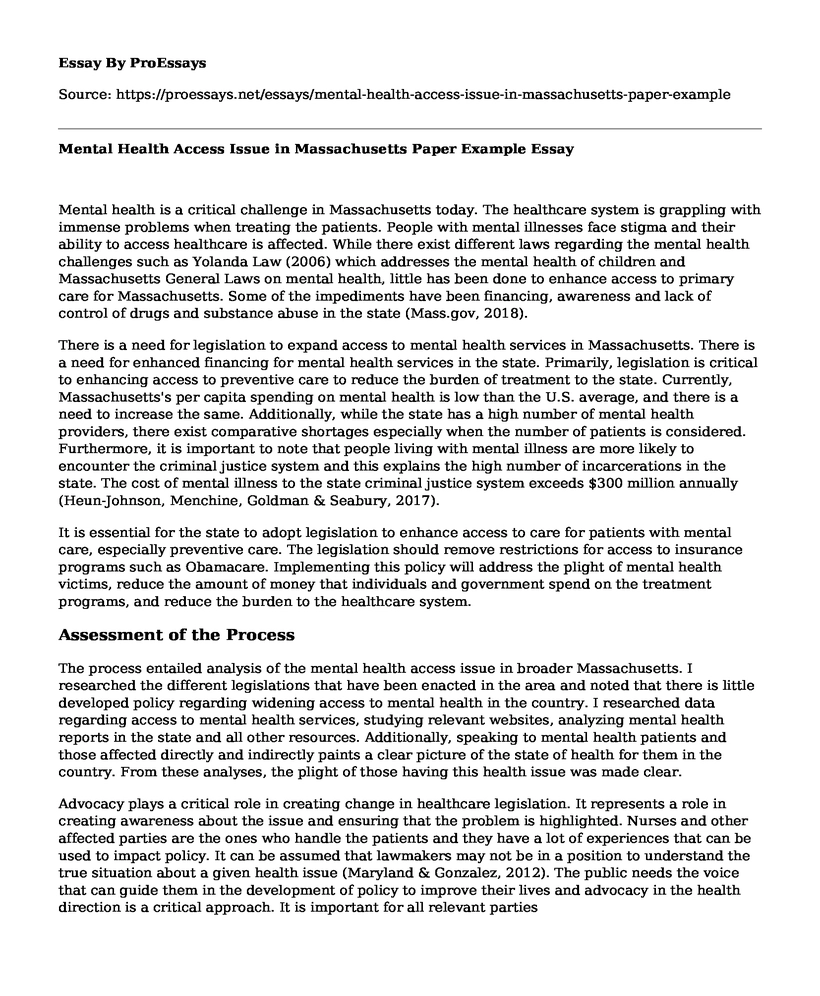Mental health is a critical challenge in Massachusetts today. The healthcare system is grappling with immense problems when treating the patients. People with mental illnesses face stigma and their ability to access healthcare is affected. While there exist different laws regarding the mental health challenges such as Yolanda Law (2006) which addresses the mental health of children and Massachusetts General Laws on mental health, little has been done to enhance access to primary care for Massachusetts. Some of the impediments have been financing, awareness and lack of control of drugs and substance abuse in the state (Mass.gov, 2018).
There is a need for legislation to expand access to mental health services in Massachusetts. There is a need for enhanced financing for mental health services in the state. Primarily, legislation is critical to enhancing access to preventive care to reduce the burden of treatment to the state. Currently, Massachusetts's per capita spending on mental health is low than the U.S. average, and there is a need to increase the same. Additionally, while the state has a high number of mental health providers, there exist comparative shortages especially when the number of patients is considered. Furthermore, it is important to note that people living with mental illness are more likely to encounter the criminal justice system and this explains the high number of incarcerations in the state. The cost of mental illness to the state criminal justice system exceeds $300 million annually (Heun-Johnson, Menchine, Goldman & Seabury, 2017).
It is essential for the state to adopt legislation to enhance access to care for patients with mental care, especially preventive care. The legislation should remove restrictions for access to insurance programs such as Obamacare. Implementing this policy will address the plight of mental health victims, reduce the amount of money that individuals and government spend on the treatment programs, and reduce the burden to the healthcare system.
Assessment of the Process
The process entailed analysis of the mental health access issue in broader Massachusetts. I researched the different legislations that have been enacted in the area and noted that there is little developed policy regarding widening access to mental health in the country. I researched data regarding access to mental health services, studying relevant websites, analyzing mental health reports in the state and all other resources. Additionally, speaking to mental health patients and those affected directly and indirectly paints a clear picture of the state of health for them in the country. From these analyses, the plight of those having this health issue was made clear.
Advocacy plays a critical role in creating change in healthcare legislation. It represents a role in creating awareness about the issue and ensuring that the problem is highlighted. Nurses and other affected parties are the ones who handle the patients and they have a lot of experiences that can be used to impact policy. It can be assumed that lawmakers may not be in a position to understand the true situation about a given health issue (Maryland & Gonzalez, 2012). The public needs the voice that can guide them in the development of policy to improve their lives and advocacy in the health direction is a critical approach. It is important for all relevant parties
References
Heun-Johnson, H., Menchine, M., Goldman, D. & Seabury, (2017). The Cost of Mental Illness: Massachusetts Facts and Figures. Schaeffer Center for Health Policy and Economics. University of Southern California. Retrieved from https://www.bhecon.org/wp-content/uploads/2017/11/MA-Chartbook-2017.pdf
Maryland, M., & Gonzalez, R. (2012). Patient advocacy in the community and legislative arena. The Online Journal of Issues in Nursing, 17(1).
Mass.gov, (2018). Massachusetts law about mental health issues. Mass.gov. Retrieved 11 October 2018, from https://www.mass.gov/info-details/massachusetts-law-about-mental-health-issues
Cite this page
Mental Health Access Issue in Massachusetts Paper Example. (2022, Sep 11). Retrieved from https://proessays.net/essays/mental-health-access-issue-in-massachusetts-paper-example
If you are the original author of this essay and no longer wish to have it published on the ProEssays website, please click below to request its removal:
- Adolescent Onset Conduct Disorder Case Study
- Research Paper on Respiratory Infections
- Health Promotions among Diverse Populations - Essay Sample
- Essay Sample on The Governing Boards Obligation on Accountability
- Psychotherapy: A Path to Healing Trauma, Coping & Mental Disorders - Research Paper
- Essay Example on The Commodification of Body Organs: How Technology Transformed Healthcare
- The Politics of Race Are Shifting, and Politicians are Struggling to Keep Pace







